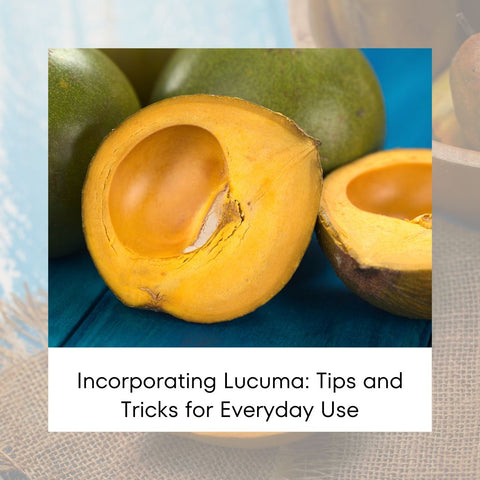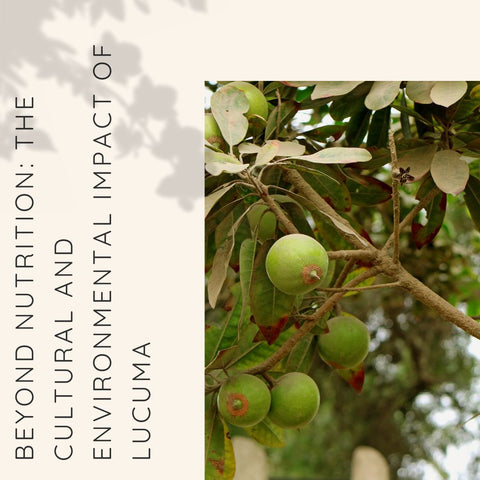Lucuma, a subtropical fruit native to South America, is gaining popularity for its exceptional health benefits and essential nutritional value. In this blog, we'll look at five compelling reasons to incorporate lucuma into your diet.
The Lucuma Lowdown: Nutrition Facts Unveiled

Here's the skinny on lucuma's nutritional value:
-
Lucuma is primarily composed of carbohydrates, with little fat and protein. It contains complex carbohydrates, which provide long-term energy without causing rapid blood sugar spikes.
-
Lucuma is high in dietary fibre, which is beneficial to digestive health and may help regulate blood sugar and cholesterol levels while also promoting feelings of fullness and satiety.
-
Lucuma contains a variety of vitamins, including vitamin C, which is essential for immune function and collagen production, as well as B vitamins, which help with energy metabolism and nervous system function.
-
Lucuma contains a variety of minerals, including potassium, magnesium, calcium, and zinc. These minerals are required for proper electrolyte balance, bone health, muscle function, and overall health.
-
Lucuma contains many antioxidants, including carotenoids, polyphenols, and flavonoids, which help protect cells from oxidative damage and lower the risk of chronic diseases.
-
Despite its sweet taste, lucuma has a low glycemic index, making it an ideal choice for those watching their blood sugar levels or adhering to a low-glycemic diet.
Breaking Down Lucuma: Vitamins, Minerals, and More
Let us break down the nutritional profile of lucuma.
-
Vitamins: Lucuma contains vitamin C, an essential nutrient that promotes immune function, collagen production, and wound healing. Niacin is essential for energy metabolism and the health of the skin, digestive system, and nervous system. Riboflavin contributes to energy production, metabolism, and the maintenance of healthy skin and vision. Thiamine is required for energy metabolism, as well as the nervous and muscular systems' proper function.
-
Minerals: Lucuma contains potassium, an electrolyte that helps regulate fluid balance, muscle contractions, and blood pressure. Calcium is essential for bone health, muscle function, nerve transmission, and blood clotting. Iron is necessary for the production of hemoglobin, which carries oxygen in the blood, and for energy metabolism. Zinc is important for immune function, wound healing, cell growth, and the maintenance of healthy skin and hair. Phosphorus is involved in bone and teeth formation, energy metabolism, and DNA synthesis.
-
Fibre: Lucuma contains dietary fibre, which promotes digestive health, regulates blood sugar levels, and aids in weight maintenance by increasing feelings of fullness and satiety.
-
Antioxidants: The carotenoids, polyphenols, and flavonoids found in lucuma help shield cells from the oxidative damage caused by free radicals. They may also lower the chance of developing chronic illnesses like diabetes, cancer, and heart disease.
-
Low Glycemic Index: Lucuma does not quickly raise blood sugar levels despite its sweet flavour. This is due to its low glycemic index. This makes it a good choice for people who are monitoring their blood sugar levels or who are on a low-glycemic diet.
The Glycemic Index of Lucuma: A Diabetes-Friendly Choice?
Lucuma has a low glycemic index (GI), making it a diabetic-friendly food when consumed in moderation as part of a balanced diet. The glycemic index is a scale that ranks carbohydrate-rich foods according to how quickly blood sugar levels rise after consumption. Low-GI foods (55 or lower) digest and absorb more slowly, resulting in a gradual increase in blood sugar levels and sustained energy. Foods with a high GI (70 or higher) are quickly digested and absorbed, causing a sudden rise in blood sugar levels.
Lucuma's high fibre content slows carbohydrate digestion and absorption, resulting in a low GI value. This gradual release of glucose into the bloodstream helps to prevent sharp spikes in blood sugar levels, making it a good option for diabetics or those looking to manage their blood sugar levels. However, it is important to note that portion size and overall dietary context play a significant role in blood sugar management. While lucuma has a low GI, consuming large amounts of it or combining it with high-GI foods may affect blood sugar levels.
Comparing Lucuma: How It Stacks Up Against Other Superfruits
When comparing lucuma to other superfruits, several factors are taken into account, including nutritional content, health benefits, taste, and culinary versatility. Here's how lucuma compares to some popular superfruits:
-
Nutritional Content:
-
Lucuma is high in vitamins, minerals, fibre, and antioxidants like vitamin C, potassium, iron, and carotenoids. It is especially notable for its high fibre content and low glycemic index.
-
Açaí berries are rich in antioxidants, including anthocyanins, which contribute to their deep purple colour. They also include healthy fats, fibre, and vitamins.
-
Goji berries are high in antioxidants like vitamin C, zeaxanthin, and beta-carotene. They also offer vitamins, minerals, and amino acids.
-
Blueberries contain a high concentration of antioxidants such as anthocyanins, flavonoids, and phenolic acids. They are also high in vitamin C and K, as well as manganese and fibre.
-
Maqui berries are known for their high antioxidant content, specifically anthocyanins and polyphenols. They also offer vitamins, minerals, and fibre.
-
Health Benefits:
-
Lucuma provides antioxidant protection, aids digestion with its fibre content, and may help regulate blood sugar levels due to its low glycemic index.
-
Açaí berries have antioxidant properties, anti-inflammatory effects, and may improve heart health and brain function.
-
Goji berries are linked to antioxidant protection, immune support, eye health, and potential anti-aging benefits.
-
Blueberries are well known for their antioxidant activity, cardiovascular benefits, cognitive support, and potential anti-inflammatory properties.
-
Maqui berries are recognized for their antioxidant power, potential anti-inflammatory properties, and support for heart health and immune function.
-
Taste and Culinary Use:
-
Lucuma has a sweet, caramel-like flavor with hints of maple and butterscotch. It is commonly used as a natural sweetener in desserts, smoothies, and baked goods.
-
Açaí berries have a rich and slightly tart flavour, with chocolate and berry notes. They are widely used in smoothie bowls, juices, and frozen desserts.
-
Goji berries are slightly sweet and tangy, with a chewy texture. They can be eaten dried as a snack, mixed into trail mixes, or blended into teas and smoothies.
-
Blueberries have a sweet, slightly tart flavour and a juicy texture. They are eaten fresh as a snack, mixed into cereals, salads, and baked goods, or blended into smoothies.
-
Maqui berries have a strong, slightly tart flavour with hints of blackberry and plum. They are commonly used in juices, smoothies, and desserts.
Top 5 Health Benefits: Why Lucuma Is a Must-Have In Your Diet

Lucuma has a plethora of health benefits, making it an excellent addition to your diet. Here are the top five reasons that lucuma is a must: Rich in antioxidants, supports digestive health, balances blood sugar levels, boosts immune function, and promotes healthy skin.
Skin Radiance and Repair: Lucuma's Beauty Boost
Lucuma's nutritional profile makes it a natural beauty booster that promotes skin radiance and repair. Here's how lucuma helps improve skin health and promote a radiant complexion:
-
Antioxidant Protection: Lucuma contains many antioxidants, including vitamin C, beta-carotene, and polyphenols. These antioxidants help to neutralise free radicals, which are molecules that can harm skin cells and contribute to premature ageing, wrinkles, and dullness. By protecting the skin from oxidative stress, lucuma helps maintain a youthful and radiant complexion.
-
Collagen Synthesis: Vitamin C, which is abundant in lucuma, is required for collagen synthesis, a process necessary for maintaining skin elasticity, firmness, and moisture. Collagen provides structural support to the skin, reducing the appearance of fine lines and wrinkles while also promoting a smooth and plump complexion.
-
Skin Repair and Regeneration: Lucuma contains nutrients such as zinc and vitamin A, which aid in skin repair and regeneration. Zinc aids in wound healing and tissue repair, whereas vitamin A stimulates cell turnover, reducing scars, dark spots, and blemishes and revealing fresher, more even-toned skin.
-
Hydration and Moisture Retention: Lucuma's high fibre content helps to retain moisture in the skin, preventing it from becoming dry and dehydrated. Adequately hydrated skin appears plump, supple, and glowing, whereas dry skin appears dull and lacklustre. By supporting skin hydration, lucuma contributes to a radiant complexion.
5. UV Protection: Beta-carotene, a vitamin A precursor found in lucuma, provides natural sun protection by absorbing UV radiation and neutralising free radicals produced by sun exposure. While lucuma cannot replace sunscreen, including beta-carotene-rich foods in your diet may provide additional sun protection and help maintain skin health.
Weight Management Wonders: Lucuma's Role in a Healthy Diet
Lucuma, when combined with a healthy diet, can help with weight management. Here's how lucuma helps with weight loss and overall health: low glycemic index, high fibre content, nutrient-dense, natural sweetener alternative, versatile, and delicious.
Cardiovascular Care: How Lucuma Supports Heart Health
Lucuma contains several nutritional components that can benefit heart health and cardiovascular care. Here's how lucuma helps a healthy heart:
-
Lucuma contains numerous antioxidants, including vitamin C, beta-carotene, and polyphenols. These antioxidants aid in the fight against oxidative stress and inflammation, both of which contribute significantly to cardiovascular diseases like heart disease and stroke. By reducing oxidative damage to blood vessels and cells, lucuma supports overall heart health.
-
Potassium, a mineral found in lucuma, helps regulate blood pressure by balancing sodium levels in the body and promoting vasodilation. Adequate potassium intake lowers blood pressure, lowering the risk of hypertension and its associated cardiovascular complications.
-
Lucuma's high fibre content may help lower LDL (bad) cholesterol levels while increasing HDL (good) cholesterol levels. Dietary fibre binds to cholesterol in the digestive tract, preventing absorption and promoting elimination from the body. By supporting healthy cholesterol levels, lucuma reduces the risk of atherosclerosis and heart disease.
-
Lucuma's low glycemic index and fibre content help to keep blood sugar levels stable, lowering the risk of insulin resistance, diabetes, and metabolic syndrome. Chronically high blood sugar levels can harm blood vessels and raise the risk of heart disease. By promoting blood sugar regulation, lucuma supports cardiovascular health.
-
Lucuma's fiber content promotes feelings of fullness and satiety, which can aid in weight management and reduce the risk of obesity, a significant risk factor for heart disease. Maintaining a healthy weight through a balanced diet that includes lucuma can help lower the risk of cardiovascular complications.
Energy Enhancement: The Natural Boost From Lucuma
Lucuma can provide a natural boost of energy and vitality due to its unique nutritional composition and health-promoting properties. Here's how lucuma increases energy levels:
-
Complex Carbohydrates: Lucuma is high in complex carbohydrates, the body's primary source of energy. These carbohydrates are slowly digested and absorbed, resulting in a consistent and sustained release of glucose into the bloodstream. This gradual energy release helps to keep blood sugar levels stable and provides sustained energy throughout the day, preventing energy crashes and fatigue.
-
Low Glycemic Index: Despite its sweet flavour, lucuma has a low glycemic index, which means it does not cause a sudden spike in blood sugar levels. Foods with a low GI digest and absorb more slowly, providing a consistent and sustained source of energy without the sudden crashes associated with high-glycemic foods.
-
Vitamin C: Lucuma is high in vitamin C, an important nutrient for energy metabolism. Vitamin C is involved in the synthesis of carnitine, a molecule that transports fatty acids into cells and converts them into energy. Additionally, vitamin C supports immune function and helps reduce oxidative stress, which can contribute to feelings of fatigue.
-
Iron: Lucuma contains iron, a mineral required for the formation of haemoglobin, a protein found in red blood cells that transports oxygen from the lungs to tissues throughout the body. Adequate iron levels are required for efficient energy production and metabolism. Iron deficiency can cause fatigue, weakness, and low energy levels.
-
B-Vitamins: Lucuma contains several B vitamins, including thiamine (B1), riboflavin (B2), niacin (B3), and pantothenic acid (B5), all of which play important roles in energy metabolism. These vitamins help the body convert carbohydrates, fats, and proteins into usable energy. B vitamins also help the nervous system function properly and combat stress and fatigue.
Navigating the Risks: Important Considerations With Lucuma

While lucuma has many health benefits, it is important to consider the risks and precautions associated with its consumption. Some important factors to consider include allergies, blood sugar management, digestive issues, medication interactions, quality and purity, pregnancy and breastfeeding, and moderation. By being aware of these factors and exercising moderation, you can safely reap the health benefits of lucuma while minimising potential risks. If you have any concerns or underlying health conditions, you should always consult with a healthcare professional before making major changes to your diet or supplement regimen.
Allergies and Adverse Effects: What You Need to Know
Here's what you should know about allergies and the potential side effects of lucuma consumption:
-
Allergies: While uncommon, some people may be allergic to lucuma or other fruits from the same botanical family, such as sapotes or eggfruit. A lucuma allergy can cause itching, swelling, hives, difficulty breathing, and, in severe cases, anaphylaxis. If you suspect you have a lucuma allergy or experience any allergic reactions after consuming it, stop using it right away and seek medical attention. Allergic reactions to lucuma are uncommon but can be serious in sensitive individuals.
-
Digestive Issues: Most people tolerate lucuma well when consumed in moderation. However, some people may experience digestive discomfort, such as bloating, gas, or diarrhoea, particularly if they consume a lot of lucuma or have underlying digestive issues like irritable bowel syndrome (IBS) or lactose intolerance. If you have digestive problems after eating lucuma, reduce your intake or avoid it completely to relieve symptoms.
-
Blood Sugar Management: Despite having a low glycemic index, lucuma contains carbohydrates and sugars that can affect blood sugar levels, especially when consumed in large quantities. Individuals with diabetes or those monitoring their blood sugar levels should limit their lucuma intake and consider its carbohydrate content when planning meals. If you have any concerns about incorporating lucuma into your diet, keep an eye on your blood sugar levels and speak with your doctor.
-
Medication Interactions: Lucuma supplements or extracts may interact with certain medications, especially those used to control blood sugar, blood pressure, or blood clotting. If you are taking medication, consult your doctor before using lucuma supplements to avoid potential interactions. Your healthcare provider can offer personalised advice based on your medical history and medication regimen.
-
Quality and Purity: To ensure purity and safety, buy lucuma from reputable brands. When possible, choose organic or certified products, and read the ingredient labels to avoid additives, fillers, or contaminants that may cause allergic reactions or other side effects.
By being aware of these potential risks and practicing moderation, you can safely reap the health benefits of lucuma while reducing the likelihood of negative consequences. If you have any concerns or experience any adverse reactions after taking lucuma, speak with a healthcare professional for further evaluation and guidance.
Dosage and Consumption: Finding Your Lucuma Balance
Several factors influence the appropriate dosage and consumption of lucuma, including individual health status, dietary preferences, and specific health goals. Here are some general guidelines to help you find the right lucuma balance:
-
If you are new to lucuma or are unsure how your body will react, start with small doses to determine tolerance and sensitivity. Begin by incorporating a teaspoon or tablespoon of lucuma powder into your smoothies, yoghurt, muesli or baked goods, gradually increasing the amount as desired.
-
Take into account your individual nutrient needs and dietary goals when incorporating lucuma into your diet. Although lucuma has no set daily recommended intake, it can be added to a balanced diet to provide extra antioxidants, vitamins, and minerals.
-
Consider your lucuma intake and its possible effect on blood glucose levels if you have diabetes or are keeping an eye on your blood sugar levels. While lucuma has a low glycemic index, eating a lot of it can still affect your blood sugar levels, so keep an eye on your levels and adjust your intake accordingly.
-
Pay attention to how your body reacts to lucuma consumption. If you experience any negative side effects, such as digestive discomfort or allergic reactions, reduce your intake or avoid lucuma entirely. Everyone's body reacts differently, so pay attention to your body's signals and adjust accordingly.
-
Lucuma can be consumed in a variety of forms, including fresh fruit, dried powder, and as an ingredient in recipes. Incorporating a variety of lucuma-containing foods into your diet can help prevent monotony and ensure a balanced intake of nutrients.
-
If you have any underlying health conditions, allergies, or questions about lucuma consumption, speak with a healthcare professional for personalised advice. They can give you advice based on your specific needs and help you determine the best dosage and consumption of lucuma for your situation.
Incorporating Lucuma: Tips and Tricks for Everyday Use

Incorporating lucuma into your daily routine is simple and enjoyable. Smoothies, oatmeal or breakfast bowls, yoghurt parfaits, baked goods, desserts, homemade snacks, beverages, sauces and dressings are all great ways to incorporate lucuma into your daily diet. By incorporating lucuma into your regular meals and snacks, you can reap its nutritional benefits and distinct flavour profile while also improving the taste and healthfulness of your diet. Experiment with various recipes and creative ways to use lucuma to find your favourite way to consume this versatile superfood.
Lucuma in the Kitchen: Creative Culinary Uses
Lucuma's sweet, caramel-like flavour and nutritional benefits make it an adaptable ingredient in the kitchen. Baking, ice cream and sorbet, smoothie bowls, raw desserts, puddings and custards, flavouring beverages, sauces, and dressings are some of the innovative culinary applications for lucuma. By incorporating lucuma into your recipes, you can enjoy its distinct flavour and nutritional benefits in a wide range of delectable and satisfying dishes. Experiment with different recipes and creative uses for lucuma to find new ways to incorporate this versatile superfood into your meals.
Smoothie Sensations: Upgrading Your Blends With Lucuma
Lucuma adds a delicious sweetness and creamy texture to smoothies, making them more filling and nutritious. Tropical paradise smoothie, chocolate lucuma bliss smoothie, green goddess smoothie, berry burst smoothie, peanut butter power smoothie, vanilla dream smoothie, and mango madness smoothie bowl are some options for adding lucuma to your smoothies. These smoothie ideas are only a starting point for incorporating lucuma into your recipes. Feel free to add your favourite fruits, greens, nut butters, and superfoods to the recipes to make delicious and nutritious smoothies that suit your taste and dietary needs.
Baking With Lucuma: Sweetening the Healthy Way
Baking with lucuma powder is an excellent way to naturally sweeten your treats while also providing a subtle caramel-like flavour and additional nutrients. Here are some ideas for baking with lucuma:
-
Lucuma Banana Bread: Replace a portion of the sugar in your favorite banana bread recipe with lucuma powder. The sweet and creamy flavor of lucuma complements the natural sweetness of bananas, resulting in a deliciously moist and flavorful loaf.
-
Lucuma Chocolate Chip Cookies: Add lucuma powder to your chocolate chip cookie dough for a unique twist on a classic favorite. The caramel-like flavor of lucuma pairs beautifully with chocolate, creating cookies that are both indulgent and nutritious.
-
Lucuma Muffins: Incorporate lucuma powder into your muffin batter for a sweet and wholesome treat. Whether you prefer blueberry, pumpkin, or apple cinnamon muffins, lucuma adds a deliciously subtle sweetness and extra nutrients to your baked goods.
-
Lucuma Energy Bars: Make homemade energy bars with lucuma powder as a natural sweetener. Combine lucuma with oats, nuts, seeds, dried fruits, and a binder like nut butter or honey to create nutritious and portable snacks that are perfect for on-the-go fuel.
-
Lucuma Cheesecake: Use lucuma powder to sweeten your cheesecake filling for a healthier twist on this decadent dessert. Pair lucuma with cream cheese, Greek yogurt, and a nut or oat crust for a creamy and indulgent treat that's lower in sugar and higher in nutrients.
-
Lucuma Pancakes or Waffles: Add lucuma powder to your pancake or waffle batter for a sweet and flavorful breakfast option. Top your pancakes or waffles with fresh fruit, Greek yogurt, and a drizzle of maple syrup for a delicious and nutritious start to your day.
-
Lucuma Granola Bars: Make homemade granola bars with lucuma powder as a natural sweetener and binder. Combine lucuma with oats, nuts, seeds, dried fruits, and a sticky sweetener like honey or maple syrup, then bake until golden and crispy for a wholesome snack option.
-
Lucuma Cake or Cupcakes: Incorporate lucuma powder into your cake or cupcake batter for a healthier alternative to traditional sweeteners. Whether you're making carrot cake, chocolate cake, or vanilla cupcakes, lucuma adds a delightful sweetness and extra nutrients to your baked treats.
Sourcing and Sustainability: Choosing Your Lucuma Wisely

When sourcing lucuma powder, it is essential to select a high-quality product that is sustainably sourced and ethically manufactured. Organic certification, fair trade, transparent sourcing, quality standards, packaging, supporting sustainable brands, and local and direct trade are all good ways to choose and buy lucuma powder responsibly. By selecting organic, Fair Trade, transparently sourced, and high-quality lucuma powder, you can reap the nutritional benefits while also supporting sustainable and ethical supply chain practices. Prioritising responsible sourcing ensures that your purchasing decisions are both environmentally conscious and socially responsible.
Selecting the Best Lucuma: Powder vs. Fresh Fruit
The decision between lucuma powder and fresh fruit is based on your preferences, convenience, and culinary needs. Here are some factors to consider when choosing the best lucuma option for your needs:
-
Fresh lucuma fruit may not be widely available in all areas, particularly outside of South America, where it is native. Lucuma powder, on the other hand, is more widely available and can be found in speciality health food stores, online retailers, and select supermarkets. If you do not have access to fresh lucuma fruit, lucuma powder is a convenient alternative.
-
Lucuma powder provides convenience and versatility in the kitchen. It has a long shelf life and is easy to store and use when needed. Fresh lucuma fruit, on the other hand, must be peeled, deseeded, and processed before use, which can be more time-consuming and labour intensive.
-
Fresh lucuma fruit has a distinct flavour that is commonly described as sweet, caramel-like, and similar to sweet potato or pumpkin. Fresh lucuma has a soft and creamy texture when ripe, making it ideal for eating raw or blending into smoothies and desserts. Lucuma powder has the flavour and aroma of fresh fruit, but with a finer texture, making it ideal for use in baked goods, beverages, and other recipes.
-
Fresh lucuma fruit and lucuma powder are both healthy choices high in vitamins, minerals, and antioxidants. However, the processing required to produce lucuma powder may have a minor impact on its nutritional content. Fresh lucuma fruit contains water, which contributes to its hydrating properties, whereas lucuma powder is more concentrated and may provide more nutrients per serving.
-
Lucuma powder is extremely versatile and can be used in a wide range of cooking applications, including baking, smoothies, desserts, sauces, and beverages. Its fine texture and sweet flavour make it a popular ingredient for recipes that require natural sweetness and depth of flavour. Fresh lucuma fruit, while less versatile, can be eaten on its own or added to fresh fruit salads, yoghurt, or ice cream.
Supporting Sustainable Lucuma Farming Practices
Supporting sustainable lucuma farming practices is critical for preserving ecosystems, safeguarding biodiversity, and ensuring the long-term viability of lucuma cultivation. To support sustainable lucuma farming, choose certified organic products, support fair trade initiatives, source directly from farmers, encourage agroforestry practices, promote sustainable land management, educate consumers, and fund research and innovation. Supporting sustainable lucuma farming practices allows consumers to help conserve natural resources, protect biodiversity, and empower farming communities. Together, we can create a more resilient and equitable food system that benefits both humans and the environment.
Beyond Nutrition: The Cultural and Environmental Impact of Lucuma

In addition to being highly nutritious, lucuma is important for the environment and culture in the areas where it is grown. Here's a closer look at how lucuma affects the environment and culture:
Cultural Impact:
-
Lucuma is deeply ingrained in South American culinary traditions, especially in Peru, Chile, and Ecuador. It is recognised as a versatile ingredient that can be used in a variety of dishes, desserts, and beverages, highlighting its rich flavour and cultural significance.
-
Lucuma holds cultural symbolism and significance in indigenous communities, where it is revered for its sacred and spiritual qualities. In some cultures, lucuma is associated with fertility, abundance, and prosperity, and its consumption is often linked to traditional rituals and ceremonies.
-
Lucuma has inspired artists, writers, and poets throughout history, who have celebrated its beauty, flavor, and cultural significance in their works. From paintings and sculptures to poems and literature, lucuma has left its mark on various forms of artistic expression, reflecting its importance in local culture and society.
-
Lucuma cultivation provides economic opportunities for thousands of small-scale farmers and agricultural workers in South America. The cultivation, harvesting, and processing of lucuma generates jobs and benefits local economies, especially in rural areas where alternative sources of income may be scarce.
Environmental Impact:
-
Lucuma is often grown using agroforestry practices that integrate fruit trees with other crops, vegetation, and wildlife habitats. Agroforestry systems promote biodiversity, soil conservation, and ecological resilience, contributing to the preservation of natural ecosystems and wildlife habitats.
-
Lucuma cultivation can benefit soil health and fertility by increasing organic matter, improving soil structure, and promoting nutrient cycling. Healthy soils promote the growth of a variety of plant species, increase water retention, and reduce erosion, all of which contribute to overall environmental sustainability.
-
Lucuma trees have deep roots that stabilise the soil and prevent erosion, lowering the risk of water runoff and soil degradation. By promoting water infiltration and retention, lucuma cultivation contributes to water conservation efforts and supports ecosystem resilience, particularly in arid and semi-arid regions.
-
Like other fruit trees, lucuma trees contribute to carbon sequestration by absorbing carbon dioxide from the atmosphere and storing it in biomass and soil organic matter. Lucuma cultivation can help to mitigate climate change by lowering greenhouse gas emissions and increasing carbon storage in agricultural landscapes.
We can appreciate lucuma's significance beyond its nutritional value and work to promote sustainable cultivation practices that benefit people and the environment by acknowledging its cultural and environmental impact. In the areas where lucuma is grown, supporting products that are ethically sourced and sustainably grown can aid in the preservation of natural resources, cultural heritage, and biodiversity.









































